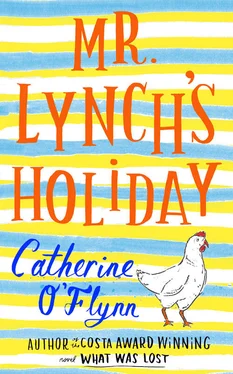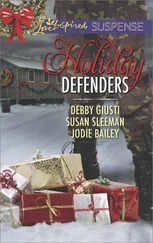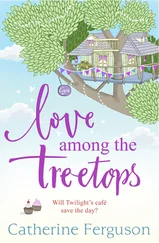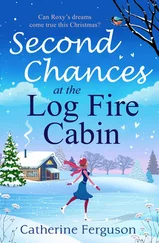Eamonn still had his head buried in the pillow when Roger came in.
‘What’s going on?’
She spoke quietly. ‘Eamonn got a bit confused.’
Roger walked over to the bed and, with a small cry of effort, lifted Eamonn over his shoulder and left the room. Dawn was breaking as he carried him up the road.
‘I thought better of you, Eamonn. I mean, I’m not going to hold it against you, don’t worry about that, but I’m just surprised and I suppose disappointed. I mean, if you marry a woman like Cheryl, you know there are always going to be pricks who want a piece of her. That’s how they think, like she’s a fucking cake and they can just take a slice. No understanding, no respect, she’s just a body to them. Those kind of men, they don’t even like women, not really. I never thought you were that type, to be honest. I mean, we’ll forget about this, we’ll put it in the past, you can’t carry these things around with you, especially not in a tiny place like this, seeing each other every day, but just now, while we’re clearing the air, I’m just saying, well, I don’t know, I suppose you’re not the man I thought you were. I’m damn sure your father raised you better than this.’
There was the sound of the buzzer and a few minutes later his father’s voice through the intercom. Roger dumped Eamonn on the ground in front of the door just as Dermot was opening it.
‘Sorry to wake you, Dermot. ’Fraid it didn’t work out at ours; thought he’d be better off back home.’
‘Right.’
‘Do you need a hand getting him in?’
‘No, I’ll be fine.’
Eamonn kept his eyes closed as his father dragged him into the lobby. He lay completely motionless while Dermot went upstairs and returned moments later. He offered no resistance as a pillow was pushed under his head and the blanket placed over him.
‘Night night, son.’
He felt his father wipe away a tear that was making slow progress down his cheek and then everything went black.
He heard his footsteps moving quickly and lightly, like a woodland creature scampering from bathroom to bedroom. He got up to catch him, but was too late, hearing the firm click of Eamonn’s door as he shut himself in once more. He knocked lightly.
‘Eamonn, are you awake in there?’
Silence.
‘Eamonn, I just heard you. Why don’t you come out and have some breakfast?’
‘I don’t want any, thanks.’
‘You can’t hide in your room for ever.’
‘I’m not hiding. I have a migraine.’
‘There’s no point feeling bad about last night. You had a bit too much to drink. Sure everyone’s done that.’
Long pause. ‘I have a migraine.’
Dermot sighed. He seemed to have spent a lot of the last fortnight addressing Eamonn’s door. It was reminiscent of the confessional box. ‘Should I call a doctor?’
‘No. I just need to lie in a dark room.’
‘For the love of God. You can’t spend your life lying in a dark room!’
Silence.
He left the apartment and went out for a walk. He’d intended to head down to the town, to get some supplies, make sure Eamonn’s cupboards were full before he returned to England. It occurred to him that that was the kind of thing sons might do for their elderly parents, not the other way round. Not for the first time he considered that his presence wasn’t helping at all. Without him around Eamonn would have to pull himself together. Maybe it was a case of sink or swim. The thought failed to reassure him. The memory of watching his son dipping beneath the waves was still lurid and nightmarish.
Despite his intention to walk into town, he found himself a few minutes later outside Inga’s door. He was more surprised than she seemed to be at his arrival there. She was putting out food on the street for the cats. A bowl of leftovers and, next to it, a large bag of uncooked rice. He frowned at the rice.
‘What are the cats to do with that?’
But she just smiled and said, ‘Come in. I was just making some coffee.’
He glanced again at the bag of rice and then followed her in.
‘How’s Eamonn?’
He ran his hand through his hair. ‘My wife was always worrying about him. Fussing. It used to drive me mad. He’s a grown man, I’d say. He has a life of his own. Now it’s my turn.’
‘They never stop being a worry.’
‘I don’t know what goes on in that head of his. I don’t pretend to.’
‘Love can make us strange.’
‘I’m not sure it took love to make Eamonn strange.’
She smiled. ‘He frustrates you.’
‘Why doesn’t he go after her? The only fight in him seems with himself.’
‘Perhaps he’s giving her space and time.’
‘Well, give someone enough space and you won’t find them again.’
She looked at him. ‘Is that an Irish saying?’
‘I don’t think so. Though I just said it and I’m Irish. Is that the same thing?’
‘You’re very good. You could do a line in tea towels.’
He seemed to consider this and said solemnly, ‘“The sayings of Dermot.”’
‘I’d buy one.’ She smiled at him again. ‘So. I was going to spend the day painting.’
‘I should go.’
‘No. I’d like you to stay.’
He sat in the same chair for hours. The room itself as absorbing as a picture. The sunlight coming through the window. Inga’s small movements, transferring paint from a palette to the canvas. The painting at the centre of it all. He shifted focus from the abstract blur of colour where her brush met the canvas, to the resolved image of the broken chair that she was painting, to the wider room which framed her. He heard the brush sink into the paint, the creaking of the easel, her irregular breathing as she concentrated. The sun moved across the room, the pool of light shifting throughout the afternoon. He must have dozed off at some point. He woke up and saw the painting, imperceptibly augmented, richer, denser. Much later on, as it started to grow dark, he spoke, unprompted, and she didn’t seem to mind:
‘I wake up sometimes in the night and I can’t work out where I am, or what year it is. I think I’m back in the house I was in as a boy. I think my brother’s asleep in the room with me. It’s like, without Kathleen there to anchor me, I’m just floating about in my own life.’
She stopped to listen when he spoke, but didn’t turn around. When he finished she went back to painting. He wondered when she would think the painting was finished. He did not want her to finish.
‘My brother Dominic died a long time ago. In America. A car crash. He and his wife, both killed. Her name was Della Schwarz. I never met her. Della Schwarz. It’s a nice name to say. She was pregnant.’ There was a long pause. ‘Six months or so. A baby. We got a letter.’
She sat down on a stool in front of her painting and laid the brush on the palette. She didn’t look at him.
‘It was his name in the letter. And she was his wife. He’d sent a telegram when they married, just a year before. It was them all right. I didn’t know him at all then. I hadn’t seen him in years. There were letters, but it was as if they were from a stranger. I didn’t know him as an adult, just this voice in the letters, talking about trains and jobs and roads and hamburgers and the people he had met.
‘It was a lorry that hit them. I imagine one of those big ones you see in American films, all chrome and pipes and a blaring horn. Crossed the carriageway and hit them head on. I suppose the driver had fallen asleep, or was drunk. I don’t know. They must have seen it coming. They must have known.
‘I remember him as a boy, waking me in the night, scared of ghosts, scared but not scared. Scared but brave. He’d call out my name, then get into bed beside me, his body frozen, like he’d been sleeping in the fields, teeth chattering with the cold, telling me about the ghosts he’d seen. I’d squeeze his hand and the chattering would slow and then eventually stop and then he’d be asleep again.
Читать дальше












